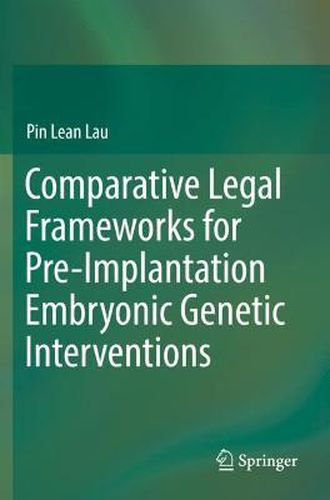Readings Newsletter
Become a Readings Member to make your shopping experience even easier.
Sign in or sign up for free!
You’re not far away from qualifying for FREE standard shipping within Australia
You’ve qualified for FREE standard shipping within Australia
The cart is loading…






This title is printed to order. This book may have been self-published. If so, we cannot guarantee the quality of the content. In the main most books will have gone through the editing process however some may not. We therefore suggest that you be aware of this before ordering this book. If in doubt check either the author or publisher’s details as we are unable to accept any returns unless they are faulty. Please contact us if you have any questions.
This book discusses the possibilities for the use of international human rights law (and specifically, international biomedical laws related to the protection of human rights and the human genome) to provide a guiding framework for the future regulation of genetic modifications applied to human embryos and other precursor materials, when these are made with the aim of implanting a genetically altered embryo in a woman. The significance and timeliness of the work derives from the recent availability of CRISPR/ Cas9 and other gene editing tools, and from lacunae in international law regarding the legality of embryo modification with these tools and appropriate governance structures for the oversight of resulting practices.
The emergence of improved genome editing tools like CRISPR/Cas9, holds the promise of eradicating genetic diseases in the near future. But its possible future applications with Pre-Implantation Genetic Diagnosis (PGD) raises a plethora of legal and ethical concerns about remaking future human beings. The work aims to address an urgent call, to embed these rising concerns about biomedical advancements into the fundamental tailoring of legal systems. Suitable regulatory approaches, coupled with careful reflection of global biomedical laws and individual constitutional systems must be explored.
The Book analyzes the impact of reproductive biomedical technologies on the legal and ethical dimensions of regulatory frameworks in selected constitutional systems like the US, the UK, Australia, Malaysia and Thailand. Employing a comparative law methodology, the work reveals a dynamic intersection between legal cultures, socio-philosophical reasoning and the development of a human rights-based framework in bio-political studies. Navigating towards a truly internationalized biomedical approach to emerging technologies, it presents an understanding why a renegotiation and reinvigoration of a contemporary and new universal shared values system in the international human rights discourse is now necessary.
$9.00 standard shipping within Australia
FREE standard shipping within Australia for orders over $100.00
Express & International shipping calculated at checkout
This title is printed to order. This book may have been self-published. If so, we cannot guarantee the quality of the content. In the main most books will have gone through the editing process however some may not. We therefore suggest that you be aware of this before ordering this book. If in doubt check either the author or publisher’s details as we are unable to accept any returns unless they are faulty. Please contact us if you have any questions.
This book discusses the possibilities for the use of international human rights law (and specifically, international biomedical laws related to the protection of human rights and the human genome) to provide a guiding framework for the future regulation of genetic modifications applied to human embryos and other precursor materials, when these are made with the aim of implanting a genetically altered embryo in a woman. The significance and timeliness of the work derives from the recent availability of CRISPR/ Cas9 and other gene editing tools, and from lacunae in international law regarding the legality of embryo modification with these tools and appropriate governance structures for the oversight of resulting practices.
The emergence of improved genome editing tools like CRISPR/Cas9, holds the promise of eradicating genetic diseases in the near future. But its possible future applications with Pre-Implantation Genetic Diagnosis (PGD) raises a plethora of legal and ethical concerns about remaking future human beings. The work aims to address an urgent call, to embed these rising concerns about biomedical advancements into the fundamental tailoring of legal systems. Suitable regulatory approaches, coupled with careful reflection of global biomedical laws and individual constitutional systems must be explored.
The Book analyzes the impact of reproductive biomedical technologies on the legal and ethical dimensions of regulatory frameworks in selected constitutional systems like the US, the UK, Australia, Malaysia and Thailand. Employing a comparative law methodology, the work reveals a dynamic intersection between legal cultures, socio-philosophical reasoning and the development of a human rights-based framework in bio-political studies. Navigating towards a truly internationalized biomedical approach to emerging technologies, it presents an understanding why a renegotiation and reinvigoration of a contemporary and new universal shared values system in the international human rights discourse is now necessary.